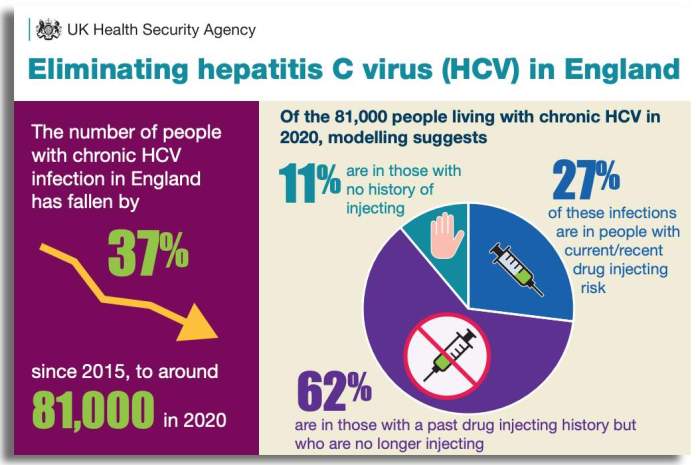The prevalence of chronic hepatitis C in England was just over 80,000 in 2020, according to the UK Health Security Agency (UKHSA), down from almost 130,000 in 2015 – a fall of nearly 40 per cent.
The figures show that there has been ‘considerable progress’ towards the target of eliminating hep C as a public health problem by 2030, the agency states.

Deaths from hep-C related advanced liver disease also fell from 482 to 314 over the same period, which exceeded the World Health Organization target of a 10 per cent drop by 2020. ‘Provisional data’ also suggests that there has been a 40 per cent reduction in the number of people injecting drugs, UKHSA says.
The reduction in prevalence is largely a result of improved access to treatment, with almost 60,000 treatments taking place between April 2015 and March 2021. Of the 81,000 people in England estimated to be living with hep C, around 27 per cent are thought to be people who have recently injected drugs, while more than 60 per cent are people with a past history of injecting. Just over 10 per cent are people with no history of injecting drug use.

More than half of people who inject drugs may have a chronic hep C infection and remain unaware of it, UKHSA estimates, and despite the ‘huge progress’ challenges remain. ‘While effective treatments are available, we need to stop people becoming infected in the first place if we are to eliminate hepatitis C,’ the agency states.
‘It is really encouraging to see cases of chronic hepatitis C declining in England,’ said UKHSA CEO Dr Jenny Harries. ‘We must keep pushing this trend downwards – too many people continue to be affected by this debilitating but preventable condition. Hepatitis C treatment has improved dramatically over recent years. Latest treatments are effective and well tolerated, so if you have been at risk or tested positive in the past don’t delay visiting your GP.’

‘In England, we are on our way to eliminating hepatitis C as the number of deaths continue to decline and direct acting antiviral drugs are available that will clear the virus in around 95 per cent of people who complete treatment,’ said UKHSA clinical scientist Dr Helen Harris. ‘But many people remain undiagnosed, often because they have no symptoms or are unaware that they have ever been at risk. If you have ever injected drugs – even if it happened only once or years ago – you could be at risk of hepatitis C. If you think you could be at risk, speak to your GP and get a free test.’
Hepatitis C in England 2022: full report at www.hcvaction.org.uk
